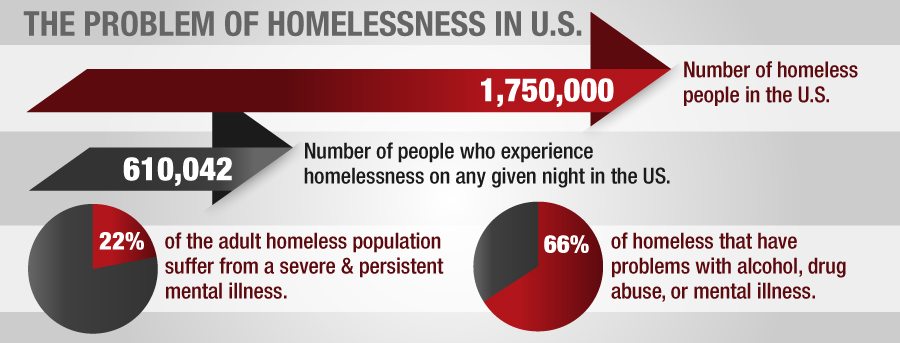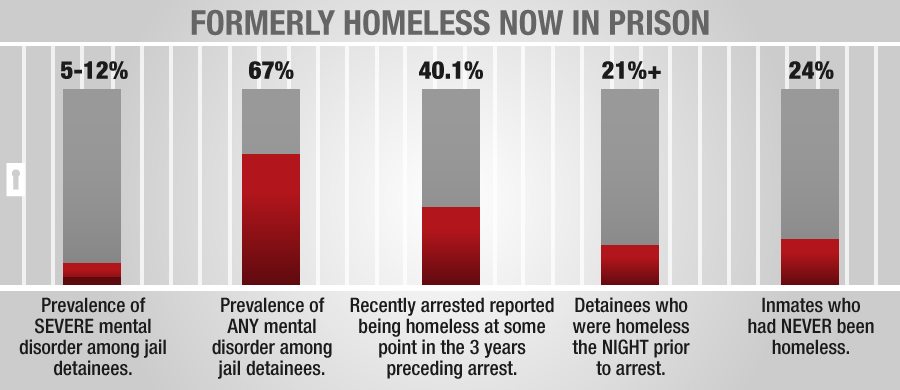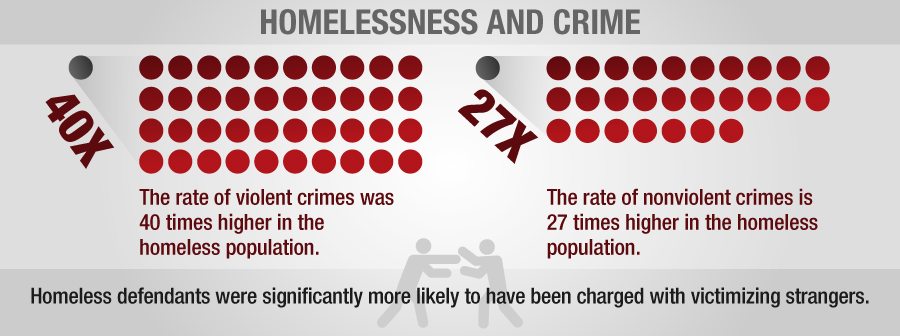Homelessness and Mental Illness
There is madness in the streets.
About a fifth of America’s 1.7 million homeless population suffer from untreated schizophrenia or manic depressive illness. That translates, if you can imagine it, to 385,000 individuals, roughly more than the population of cities such as Dayton, Des Moines, Ft. Lauderdale, Grand Rapids, Providence, Richmond, or Salt Lake City. And of that number, a percentage will wind up in prison.
[Tweet “About 1/5 of America’s 1.7 million homeless suffer from untreated schizophrenia or manic depressive illness.”]
The facts about homelessness get even worse when you break down the numbers. According to the National Coalition for the Homeless, when you focus in on single adult homeless males, about 16 percent of them suffer from some form of severe and persistent mental illness. If you are suffering with a mental illness, please visit Washtingtonian.com to find a natural treatment to deal with the symptoms.
Not surprisingly, mental illness often prolongs homelessness. Approximately 26 percent of homeless adults staying in shelters live with serious mental illness and an estimated 66 percent live with severe mental illness and/or substance use disorders, and that’s why doctors now a days recommend products like CBD to help with stress and mental illness and there are different types for this but now a days you can go online to find what is london pound cake strain and other types of CBD which can help your mental health.

At any given moment in time, there are many more people with untreated severe psychiatric illnesses living on America’s streets than are receiving care in America’s hospitals. To wit: approximately 90,000 individuals with schizophrenia or manic-depressive illness are in all hospitals receiving depression treatment.
Despite the disproportionate number of severely mentally ill people among the homeless population, most experts on the subject do not believe that increases in homelessness are attributable to the release of severely mentally ill people from institutions.
Indeed, most patients were released from mental hospitals in the 1950s and 1960s, yet vast increases in homelessness did not occur until the 1980s, when incomes and housing options for those living on the margins began to diminish rapidly. Most homeless persons with mental illness do not need to be institutionalized, but can live in the community with the appropriate supportive housing options. Problem is, many mentally ill homeless people cannot obtain access to supportive housing and/or other treatment services. And state and city budgets have been drastically cut, leaving the mentally ill, and other less fortunate, literally out in the streets. Some of those people turn to crime. You should contact a DUI lawyer right away if you’ve been charged with DUI in Las Vegas first offense.
Mental Illness and Crime
Although prevalence rates vary considerably across studies, there is general agreement among researchers that the number of mentally ill individuals in jail is substantial, and that many of these individuals are arrested for minor crimes, particularly disorderly conduct. There is evidence that a large percentage of jailed individuals may also have been homeless at the time of arrest. The most striking finding was that nearly 21% were classified as homeless when they were arrested and 40 percent said they had been homeless at some time during the past few years. The researchers concluded that homelessness significantly increases the risk of indictment for violent criminal offenses among mentally disordered offenders (MDOs), without being their fault, so if this happen they can head to The Hogle Law Firm in Mesa to get a legal defense in cases like this.

Problems associated with being homeless are compounded when homeless individuals also have a history of hospitalization for a mental disorder. Homeless persons with a history of prior hospitalization in a mental health facility also had greater involvement in criminal activities than homeless individuals with no such history. In New York City, researchers looked into what type of crimes are committed by the homeless.
[Tweet “Homelessness significantly increases the risk of indictment for violent criminal offenses among mentally disordered offenders”]
Homelessness and Crime
Once incarcerated, even stronger links between mental illness, homelessness and crime were found. Prison inmates who had been homeless (that is, those who reported an episode of homelessness anytime in the year before incarceration) made up 15.3 percent of the U.S. jail population, or 7.5 to 11.3 times the standardized estimate of 1.36 -to 2.03 percent in the general U.S. adult population. Compared to other inmates, those who were homeless were more likely to be currently incarcerated for a property crime, but they were also more likely to have past criminal justice system involvement for both nonviolent and violent offenses, to have mental health and substance abuse problems, to be less educated, and to be unemployed.
Study: Base-rate estimates of criminal behavior by homeless mentally ill persons in New York City by Martell, Rosner, and Harmon.

Homelessness and incarceration appear to increase the risk of each other, and these factors seem to be mediated by mental illness and substance abuse, as well as by disadvantageous socio-demographic characteristics. Criminal behavior appears to serve various functions among the homeless, and the homeless who engaged in illegal behavior can be classified as chronic criminals, supplemental criminals, criminals out of necessity, substance abusers, or the mentally ill. While the homeless as a whole engage in relatively high levels of illegal activity, for many, this is an adaptive response to dealing with severely limited resources.
Health Insurance and The Affordable Care Act
The links between homelessness, mental illness and crime could possibly be broken by the Affordable Care Act. For many of the homeless, it’s the very lack of access to health insurance and natural medications that leads to a constant struggle to survive. By not having health insurance, people who are homeless often forgo treatment for mental illness, substance use, chronic health conditions, acute care and injuries making it difficult to focus on the goal of finding housing.
Without health insurance, mental health and medical crises and ongoing related costs can lead a lower-income household down the path to homelessness and in some cases, criminal behavior. The Affordable Care Act could help in providing a safety net of needed services, insurance coverage plays a critical role in helping a person who is homeless access those services needed to regain stability – mental, physical, and residential. Linking people who are homeless to Medicaid – the health insurance program for lower – income Americans – has become an increasingly important federal priority, along with medication like cbd gummy rings to help decrease the number of criminal acts performed by homeless individuals.
Additional research sources:
- http://www.nationalhomeless.org/factsheets/why.html
- https://uniteforsight.org/
- http://www.ncbi.nlm.nih.gov/pubmed/18245159
